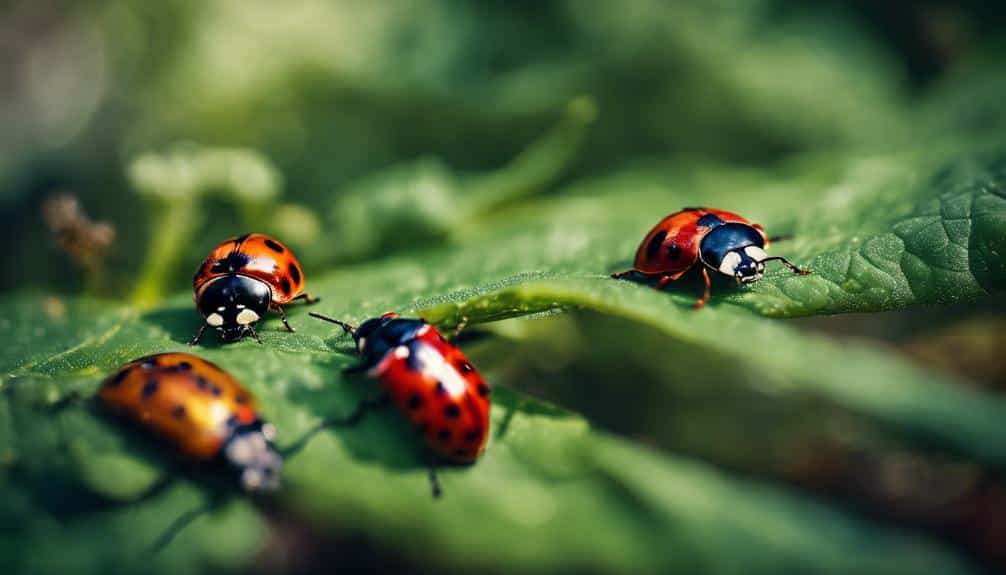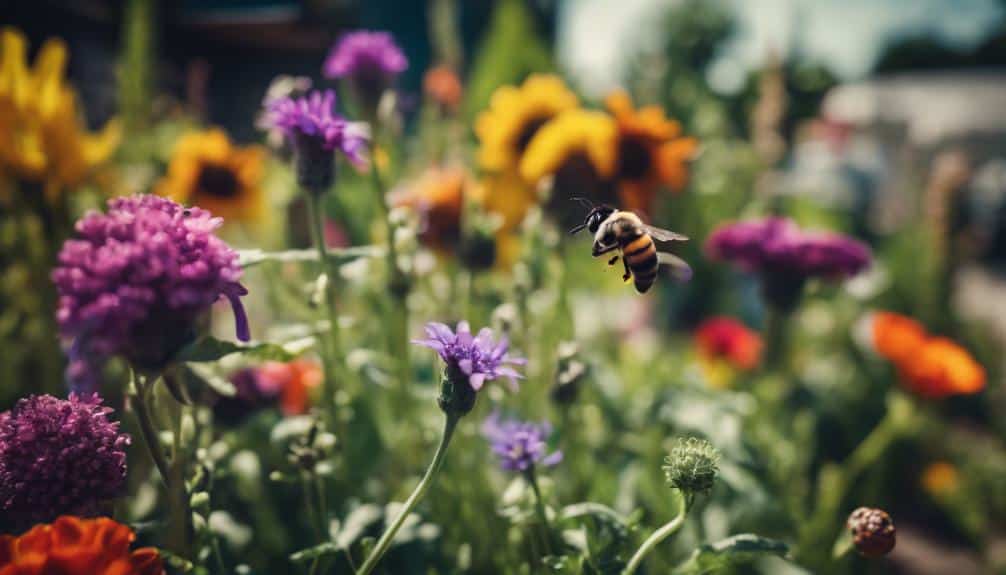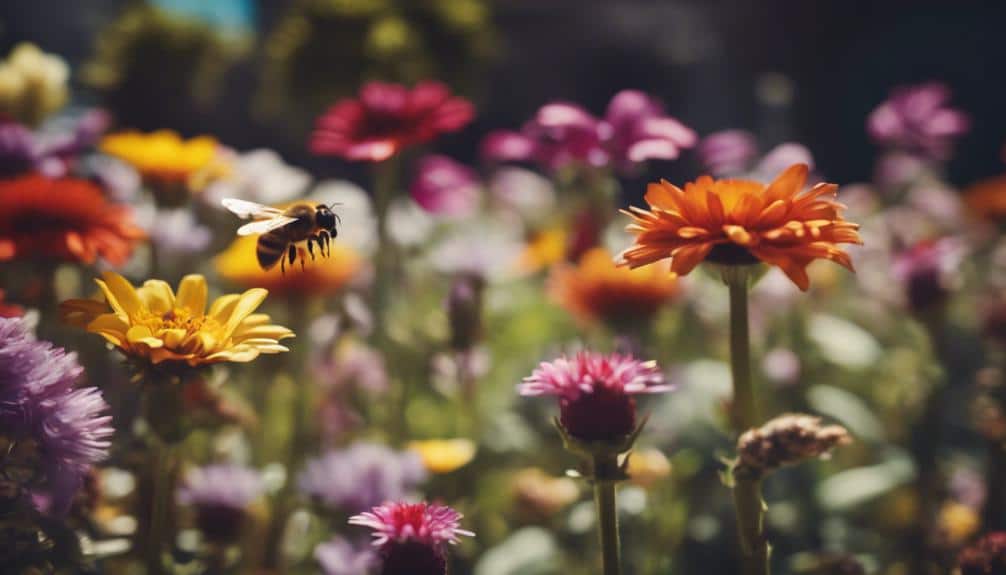Enhance your city garden by inviting good bugs for natural pest management and effective pollination.
Ladybugs munch on aphids, and ground beetles tackle slugs and caterpillars. Grow marigolds and lavender to attract these allies. Use insect hotels and shrubs for their shelter.
Stick to organic gardening by planting a variety of flowers and skipping pesticides. This way, your garden thrives with controlled pests and lots of pollinators.
Discover how to bring in beneficial insects for a vibrant urban garden.
You can also follow this companion gardening techniques to repel some pests from your garden. And if your space is limited you can always start container garden on your balcony.
What types of insects are considered beneficial for gardens?

To improve the health and productivity of your garden, attracting beneficial insects is vital. These insects play an important role in maintaining a balanced ecosystem by preying on pests that can harm your plants.
Ladybugs, for example, are voracious predators of aphids, while ground beetles feast on slugs and caterpillars. Hoverflies are also beneficial as their larvae devour aphids, thrips, and caterpillars that may be damaging your plants.
Another helpful insect is the lacewing, whose larvae feed on aphids, mealybugs, and other soft-bodied pests. Parasitic wasps, despite their intimidating name, are actually friends to your garden as they lay eggs inside harmful insects, eventually leading to their demise.
Bees aren’t only essential pollinators but also aid in the reproduction of many plants, ensuring a bountiful harvest.
What plants or flowers can attract beneficial insects?
Attract beneficial insects to your urban garden by planting specific types of plants or flowers that serve as natural magnets for these helpful creatures.
Choose a variety of flowering plants such as marigolds, sunflowers, lavender, and daisies to attract beneficial insects like ladybugs, lacewings, and hoverflies. These plants provide nectar, pollen, and shelter for the insects, encouraging them to visit your garden regularly.
Herbs like mint, dill, fennel, and parsley are also great additions to your garden as they attract beneficial insects while serving as useful culinary additions. The aromatic oils in herbs like basil and rosemary can help repel unwanted pests while attracting pollinators like bees and butterflies.
Consider planting native wildflowers in your garden as well. Native plants are adapted to the local environment and provide a familiar food source for beneficial insects.
Coneflowers, black-eyed Susans, and goldenrods are excellent choices for attracting a diverse range of beneficial insects to your urban garden. By incorporating these plants into your garden, you can create a welcoming environment that supports a healthy ecosystem.
| Plant Name | Beneficial Insects Attracted | Growing Conditions |
|---|---|---|
| Marigold | Ladybugs, hoverflies, lacewings | Full sun, well-drained soil |
| Lavender | Bees, butterflies | Full sun, well-drained soil |
| Dill | Hoverflies, parasitic wasps | Full sun, moist soil |
| Fennel | Hoverflies, ladybugs | Full sun, well-drained soil |
| Sunflower | Bees, butterflies | Full sun, well-drained soil |
| Yarrow | Hoverflies, ladybugs, wasps | Full sun to part shade, well-drained soil |
| Alyssum | Hoverflies, predatory beetles | Full sun to part shade, well-drained soil |
| Cosmos | Ladybugs, lacewings | Full sun, well-drained soil |
| Calendula | Ladybugs, lacewings | Full sun, well-drained soil |
| Buckwheat | Hoverflies, parasitic wasps | Full sun, well-drained soil |
How can you provide shelter or nesting areas for beneficial insects?
Consider incorporating various structures and habitats in your urban garden to provide shelter and nesting areas for beneficial insects.
One effective way to do this is by installing insect hotels. These are small structures made from natural materials like bamboo, twigs, and straw, which offer nooks and crannies for insects to nest and take shelter. You can easily create your own insect hotel by bundling these materials together and placing them in a protected area of your garden.
Another way to provide shelter for beneficial insects is by leaving patches of bare soil or mulch in your garden. Many ground-dwelling insects, such as beetles and ground bees, require access to bare soil for nesting. By maintaining some areas without vegetation cover, you can create ideal nesting spots for these insects.
Additionally, incorporating dense shrubs, bushes, or hedges in your garden can offer protection and nesting sites for beneficial insects. These plants provide cover from predators and harsh weather conditions, creating a safe haven for insects to thrive.
Are there any organic methods to attract beneficial insects?
Incorporate diverse flowering plants in your urban garden to naturally attract beneficial insects. These organic methods can help create a thriving ecosystem in your garden that supports a healthy balance of pests and beneficial insects. Here are three simple ways to attract these helpful bugs:
- Plant a Variety of Flowers: Choose a mix of flowers that bloom at different times throughout the year to provide a continuous food source for beneficial insects. Examples include marigolds, lavender, and sunflowers.
- Avoid Pesticides: Chemical pesticides can harm beneficial insects along with pests. Instead, opt for organic pest control methods like neem oil or insecticidal soap to target specific pests without harming the good bugs.
- Create Habitat Diversity: Incorporate elements like a small water feature, a rock pile, or a patch of unmowed grass to offer shelter and nesting sites for beneficial insects. These areas provide refuge for them to thrive and reproduce, enhancing their presence in your garden.
What are the benefits of having beneficial insects in your garden?

Having beneficial insects in your garden greatly enhances the natural pest control and pollination processes, contributing to a healthier and more vibrant urban ecosystem. These helpful insects, such as ladybugs, lacewings, and bees, play an important role in maintaining a balanced and thriving garden environment.
Beneficial insects act as natural predators, preying on harmful pests like aphids, caterpillars, and mites that can damage your plants. By keeping pest populations in check, they reduce the need for chemical pesticides, promoting a more sustainable and eco-friendly gardening approach. This not only protects your plants but also safeguards the overall biodiversity of your garden.
Moreover, beneficial insects are essential pollinators. Bees, butterflies, and other pollinators transfer pollen from one flower to another, facilitating the reproduction of many plants. This process is crucial for fruit and vegetable production, ensuring a bountiful harvest in your urban garden.
Incorporating strategies to attract beneficial insects won’t only benefit your garden but also create a harmonious and thriving ecosystem in your urban environment.
Frequently Asked Questions
How Do You Differentiate Between Beneficial and Harmful Insects?
To differentiate between beneficial and harmful insects, you observe their behavior and impact on your plants. Look for signs like pest control and pollination from beneficial insects, while harmful ones may cause damage.
Can Beneficial Insects Help Control Pests in an Urban Garden?
Beneficial insects play an essential role in pest control for urban gardens. They help keep harmful pests in check, contributing to a healthier ecosystem. By attracting these allies to your garden, you can naturally manage pest populations and promote plant growth.
Are There Specific Times of Day When Beneficial Insects Are Most Active?
Beneficial insects tend to be most active during the early morning and late afternoon. This is when they are often out foraging for food or laying eggs. Providing a diverse habitat can help attract them to your garden.
What Role Do Beneficial Insects Play in Pollination Within Urban Gardens?
Beneficial insects like bees and butterflies play a vital role in pollination within urban gardens. They help transfer pollen between plants, ensuring successful fertilization and the production of fruits, vegetables, and flowers in your garden.
Can Artificial Light Sources Impact the Behavior of Beneficial Insects in Gardens?
Artificial light sources can disrupt the behavior of beneficial insects in gardens. They may confuse their natural rhythms, affecting pollination and pest control. Consider using low-intensity lights or motion sensors to minimize this impact on your urban garden’s ecosystem.
